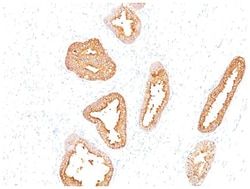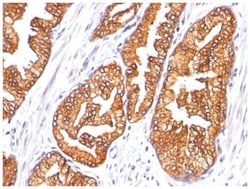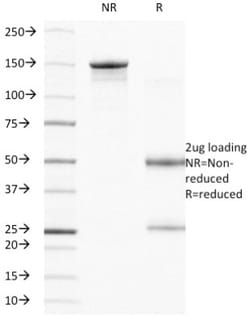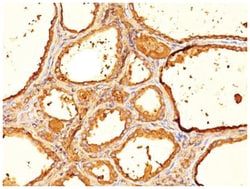Kallikrein 3/PSA Antibody (A67-B/E3), Novus Biologicals™
Mouse Monoclonal Antibody has been used in 1 publication
Manufacturer: Fischer Scientific
The price for this product is unavailable. Please request a quote
Antigen
Kallikrein 3/PSA
Dilution
Western Blot 0.5-1.0ug/ml, Flow Cytometry 0.5-1ug/million cells, Immunocytochemistry/Immunofluorescence 0.5-1ug/ml, Immunoprecipitation 0.5-1ug/500ug protein lysate, Immunohistochemistry-Paraffin 0.5-1.0ug/ml, Immunohistochemistry-Frozen 0.5-1.0ug/ml, SDS-Page
Classification
Monoclonal
Form
Purified
Regulatory Status
RUO
Target Species
Human
Gene Accession No.
P07288
Gene ID (Entrez)
354
Immunogen
PSA (p30) from human sperm plasma
Primary or Secondary
Primary
Content And Storage
Store at 4C.
Clone
A67-B/E3
Applications
Western Blot, Flow Cytometry, Immunocytochemistry, Immunofluorescence, Immunoprecipitation, Immunohistochemistry (Paraffin)
Conjugate
Unconjugated
Host Species
Mouse
Research Discipline
Cancer, Cellular Markers, Prostate Cancer
Formulation
PBS with 0.05% BSA. with 0.05% Sodium Azide
Gene Alias
APS seminin, EC 3.4.21, EC 3.4.21.77, Gamma-seminoprotein, hK3, kallikrein 3, (prostate specific antigen), Kallikrein-3, kallikrein-related peptidase 3, KLK2A1, P-30 antigen, prostate specific antigen, prostate-specific antigen, PSA, PSA semenogelase, Semenogelase, Seminin
Gene Symbols
KLK3
Isotype
IgG1 κ
Purification Method
Protein A purified
Test Specificity
Recognizes a single protein of 33-34kDa, identified as the prostate specific antigen (PSA). This MAb is highly specific to PSA and stains prostatic secretory and ductal epithelium in both normal and neoplastic tissues. PSA is a chymotrypsin-like serine protease (kallikrein family) exclusively produced by the prostate epithelium, and abundant in seminal fluid. PSA can be detected in the sera of patients with prostatic carcinoma. It is predominantly complexed to a liver-derived serine protease inhibitor, alpha-1-antichymotrypsin (ACT). A higher proportion of serum PSA is complexed to ACT in prostate cancer than in benign prostate hyperplasia. This MAb makes an excellent pair with MAb 1A7G6B6 for PSA tests.
Description
- Description Kallikrein 3/PSA Monoclonal specifically detects Kallikrein 3/PSA in Human samples
- It is validated for Flow Cytometry, Immunohistochemistry, Immunohistochemistry-Paraffin.




